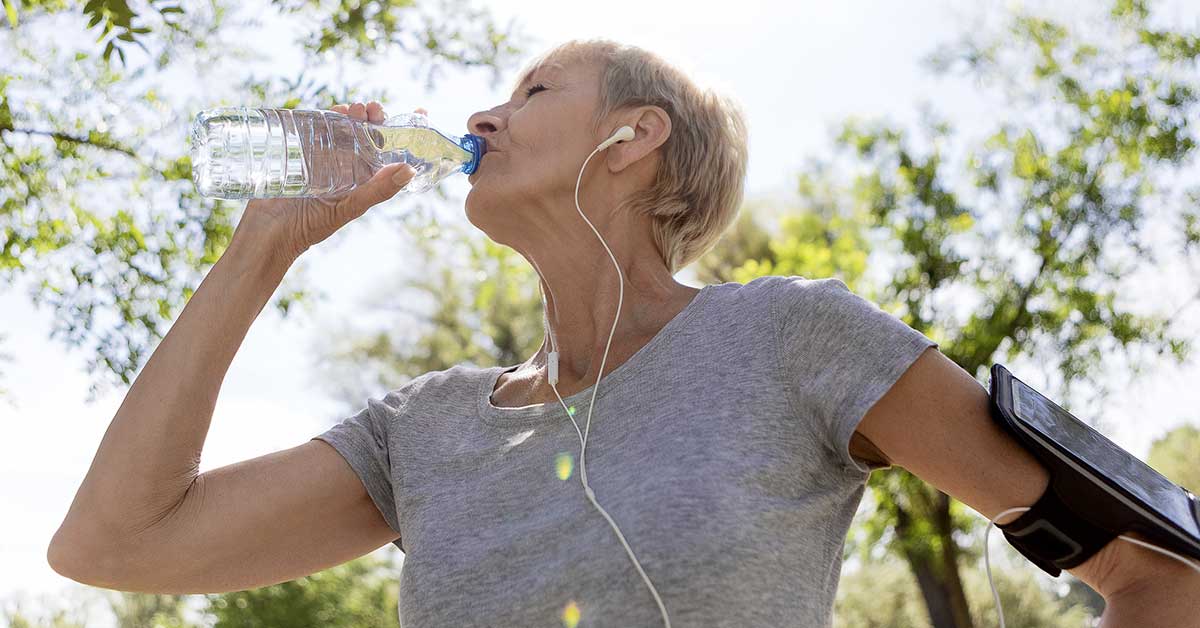
5 Summer Safety Tips for Cancer Patients and Survivors
-
Summer can pose unique health challenges for those dealing with cancer. Whether you’re a long-term survivor or are still undergoing treatment, here’s how to stay healthy and safe while enjoying the season.
1. Fend off food poisoning. Cancer therapies can make you more susceptible to infection, including bacteria and pathogens that cause food poisoning. People with cancer are more likely to have longer and more serious foodborne illnesses if they get sick.
Steps to reduce your risk:
- Wash your hands with warm water and soap for at least 20 seconds before and after handling food.
- Keep uncooked foods—especially raw meat, poultry, seafood, and eggs—separate in your shopping cart, grocery bag, and refrigerator, and always wash plates that held these foods before reusing them.
- Refrigerate or freeze foods within two hours of cooking or buying them—or within one hour if it’s hotter than 90 degrees outside.
- Beware of potentially dangerous foods. Unpasteurized dairy products, raw or undercooked meat/poultry/shellfish, and unwashed vegetables can all increase your risk of food poisoning.
2. Beat the heat. Hot weather can be uncomfortable for everyone. But, for cancer patients, it can trigger hot flashes in patients. It can also make wigs uncomfortable and itchy.
Steps to reduce your risk:
- Wear breathable fabrics that allow sweat to evaporate.
- If you’ve lost your hair, consider wearing a cotton head scarf instead of a wig.
- Keep cold water, low-sugar juices, sports drinks, or frozen juice pops on hand—consuming them can help keep you cool.
- If your doctor has OK’d exercise, try swimming. The water will keep your body temperature down as you work out.
3. Protect your skin. Some cancer medications and treatments—including certain types of chemotherapy—can make skin more sensitive to the sun.
Steps to reduce your risk:
- It’s especially important to use sunscreen. Apply at least one ounce of sunscreen 15 to 30 minutes before you go outside. That’s enough sunscreen to fill a shot glass. Reapply every two hours, or every hour if you’re swimming or sweaty.
- Pay attention to the UV index. Stay inside when the index is 10 or higher. And keep in mind that reflective surfaces like water and sand increase your risk of sunburn.
4. Stay hydrated. Cancer treatment side effects like diarrhea and vomiting can increase your risk for dehydration.
Steps to reduce your risk:
- Watch out for a dry mouth, fatigue, nausea, headaches, constipation, and dizziness—all possible signs of dehydration.
- Make a conscious effort to drink regularly, even if you don’t feel thirsty. This is especially important before you exercise or go out in hot weather.
- If drinking plain water isn’t appealing, add lemon or try flavored water. Milk, low-sugar juice, and tea low in caffeine are also good options.
- Eating foods that are high in water—like lettuce, watermelon, and broccoli—can help keep you hydrated too.
5. Travel smart. Summer is often a big travel time. A little preparation can ensure a healthy and fun trip.
Steps to reduce your risk:
- Talk to your doctor before hitting the road. Find out if there are any restrictions or recommendations you should follow. For instance, if you’re going to be in close quarters with other travelers, such as on an airplane, ask your doctor if you should wear a mask, which helps protect against airborne viruses and bacteria.
- Make sure you have enough medication to get you through your trip.
- Take a copy of your medical records along for the ride. At minimum, you should have a list of your current medications and current and past cancer treatments.
- Give a family member a copy of your records as well and list this person under ICE (In Case of Emergency) in your cellphone.
